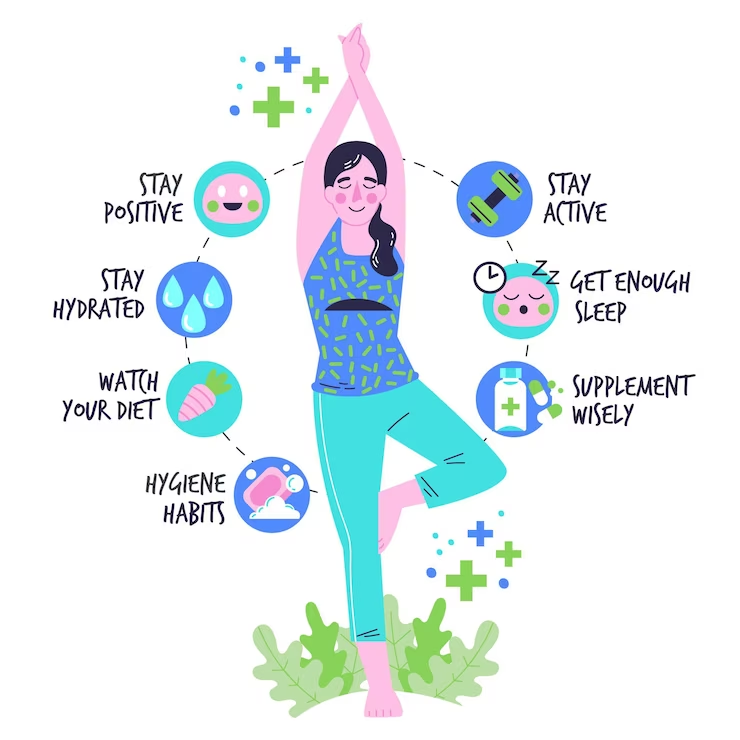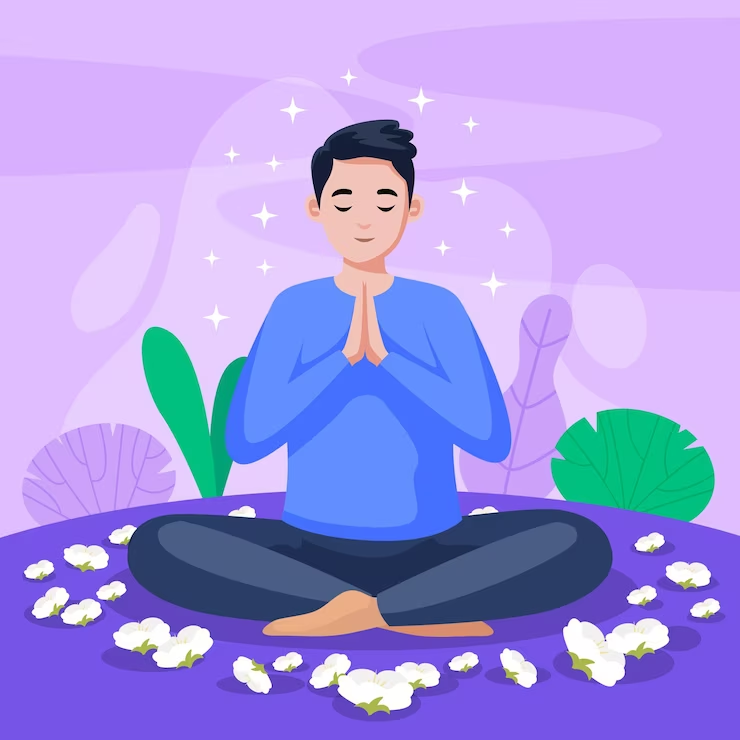Meditation is a powerful tool that can help you improve your mental and physical health and the HumanWisdom app can help you do this. It is a practice that has been used for centuries to reduce stress and anxiety, improve focus and concentration, and promote overall well-being. In this blog, we will discuss how to meditate, including different techniques, tips, and benefits.

What is Meditation?
Meditation is a technique that involves focusing your mind on a particular object, thought, or activity. The goal is to train your mind to be more aware and present in the moment, which can help you to reduce stress and anxiety, and improve your overall well-being.
There are many different types of meditation, including mindfulness meditation, breath awareness meditation, mantra meditation, and body scan meditation. Each type of meditation has its own unique benefits and techniques, but they all share the goal of training the mind to be more focused and present. The HumanWisdom app can help you understand meditation better.
How to Meditate?
Meditation can be practiced by anyone, regardless of their age or experience. Here are some basic steps to help you get started:
Find a quiet and comfortable place to meditate: Choose a quiet place where you will not be disturbed. You can sit on a cushion, a chair, or a yoga mat. Wear comfortable clothing that allows you to sit for an extended period.
Choose a time to meditate: Choose a time that works best for you. It can be in the morning, afternoon, or evening. Try to meditate at the same time each day to establish a routine.
Set a timer: Start with 5-10 minutes and gradually increase the time as you become more comfortable with the practice.
Focus on your breath: Close your eyes and take a few deep breaths. Focus on the sensation of your breath moving in and out of your body. If your mind wanders, gently bring your focus back to your breath.
Be present in the moment: Allow yourself to be fully present in the moment. Notice any thoughts, feelings, or sensations that arise, and simply observe them without judgment.
End your practice: When your timer goes off, gently open your eyes and take a few deep breaths. Take a moment to notice how you feel and bring that feeling with you as you go about your day.
Use the breathing exercises in the HumanWisdom app to help you do this.

Tips for Successful Meditation
Practice regularly: Consistency is key when it comes to meditation. Try to meditate for at least 5-10 minutes each day.
Be patient: It takes time and practice to master meditation. Don’t get discouraged if your mind wanders or if you find it challenging to focus at first.
Use guided meditations: Guided meditations can be helpful, especially if you are new to meditation. The HumanWisdom app has some guided audio meditations for you to try.
Benefits of Meditation
Reduces stress and anxiety: Meditation can help you to reduce stress and anxiety by promoting a state of relaxation and calmness.
Improves focus and concentration: Regular meditation can help you to improve your focus and concentration, which can be beneficial for work, school, or other activities.
Promotes overall well-being: Meditation can improve your overall well-being by helping you to develop a more positive outlook, improve sleep, and reduce symptoms of depression.
Reduces symptoms of chronic pain: Meditation has been shown to be an effective way to reduce the symptoms of chronic pain, including back pain, headaches, and fibromyalgia.
Improved emotional regulation: Regular meditation can help you to regulate your emotions, reduce stress and anxiety, and cultivate positive emotions like gratitude and compassion.
Increased self-awareness: By practicing meditation, you can develop a greater understanding of your thoughts, feelings, and behaviors. This can help you to become more self-aware and make positive changes in your life.
Reduced symptoms of depression: Meditation has been shown to be an effective way to reduce symptoms of depression, including low mood, lack of motivation, and negative thoughts.
Increased focus and concentration: Regular meditation can help you to improve your focus and concentration, which can be beneficial for work, school, or other activities that require mental clarity.
Improved sleep: Meditation has been shown to improve sleep by promoting relaxation and reducing stress and anxiety.

There are many different types of meditation, each with its own unique benefits and techniques. Here are some of the most popular types of meditation:
Sleep meditation: This technique that can help you to relax and fall asleep more easily. It involves focusing your mind on your breath or a guided meditation while lying in bed. Sleep meditation can be helpful if you have trouble falling asleep or staying asleep. The HumanWisdom app has breathing techniques you can try.
Sleep meditation is a type of meditation that is designed to help you relax and fall asleep more easily. It can be particularly useful for those who struggle with insomnia or who have difficulty calming their minds at bedtime. Sleep meditation can be done on your own or with the help of a guided meditation.
One of the key elements of sleep meditation is focusing on your breath. By paying attention to your breathing, you can slow down your heart rate and quiet your mind, making it easier to fall asleep. You can do this by taking long, slow breaths in through your nose and out through your mouth, focusing on the sensation of the air moving in and out of your body.
Another technique used in sleep meditation is progressive muscle relaxation. This involves tensing and then relaxing different muscle groups in your body, one at a time. By doing this, you can release any tension or stress that may be preventing you from falling asleep.
Guided sleep meditations can be particularly helpful for those who are new to meditation or who struggle with maintaining focus during a meditation practice. There are many guided sleep meditations available online or through meditation apps that can help you to relax and fall asleep more easily.
Benefits of Sleep Meditation
Sleep meditation can help to improve the quality of your sleep, allowing you to feel more rested and alert during the day. It can also help to reduce stress and anxiety, which can interfere with a good night’s sleep. In addition, sleep meditation can help to lower your heart rate and blood pressure, leading to better overall health.
Guided meditation: This form of meditation where a teacher or a recording leads you through the practice. It typically involves a meditation teacher providing verbal instructions on what to focus on, what to visualize, and what to do with your mind and body during the practice. The HumanWisdom app has a number of guided meditations you can try.
Guided meditation is a form of meditation where a teacher or a recording leads you through the practice. It typically involves a meditation teacher providing verbal instructions on what to focus on, what to visualize, and what to do with your mind and body during the practice. Guided meditations can be done in person or through various digital mediums, such as apps, websites, or recordings.
Guided meditations can be a helpful way to start a meditation practice, especially if you’re new to meditation. They can provide structure, guidance, and accountability, and can help you to overcome some of the initial challenges that may arise when learning to meditate.
Guided meditations can also be focused on a variety of topics, such as stress reduction, relaxation, self-compassion, mindfulness, and personal growth. Many guided meditations also incorporate music, nature sounds, or other calming sounds to enhance the relaxation response.
Mindfulness meditation: This type of meditation involves focusing your attention on the present moment, without judgment or distraction. It can help you to reduce stress, anxiety, and depression, and increase your overall sense of well-being. The HumanWisdom app has some mindful meditations you can practice.
Mindfulness meditation is one of the most popular types of meditation, and it involves cultivating awareness of the present moment without judgment or distraction. By focusing on the present moment, mindfulness meditation can help you to become more grounded and centered, and to reduce stress and anxiety. Some of the key features of mindfulness meditation include:
Focusing on the breath or other sensations in the bo
Noticing thoughts and feelings without getting caught up in them
Bringing your attention back to the present moment whenever your mind wanders
Cultivating an attitude of acceptance and non-judgment towards your experiences
There are many different ways to practice mindfulness meditation, including seated meditation, walking meditation, and body scan meditation. With regular practice, mindfulness meditation can help you to develop greater awareness, compassion, and resilience in your daily life.
Breath awareness meditation: This involves focusing your attention on your breath, noticing each inhale and exhale. This type of meditation can help you to improve your concentration and reduce stress. There is a separate breathing module on the HumanWisdom app that you can use to try different breathing techniques.
Breath awareness meditation is a type of meditation that involves focusing your attention on your breath, noticing each inhale and exhale. This practice can help you to become more aware of your breathing patterns, and to cultivate a sense of calm and relaxation. By focusing on the breath, you can also improve your concentration and reduce stress and anxiety.
Breath awareness meditation can be practiced in many different ways, but the basic technique involves finding a comfortable seated position and bringing your attention to your breath. You might choose to focus on the sensation of the breath moving in and out of your nostrils, or on the rise and fall of your chest or belly. Whenever your mind starts to wander, simply bring your focus back to the breath, without judgment or self-criticism.
Over time, regular practice of breath awareness meditation can help you to develop greater awareness and control of your breath, which can have a positive impact on your physical and mental health. It can also help you to become more mindful and present in your daily life.
Loving-kindness meditation: This type of meditation involves focusing on feelings of love, kindness, and compassion for yourself and others. It can help you to develop a more positive outlook and improve your relationships.
Loving-kindness meditation is a type of meditation that involves cultivating feelings of love, kindness, and compassion towards oneself and others. The practice usually starts with developing a feeling of love towards oneself, then towards someone who is dear to us, then towards a neutral person, and finally towards someone who we might be having difficulties with. The goal of the practice is to cultivate positive emotions and a sense of connectedness with others. It has been shown to improve well-being, reduce stress, and enhance positive social relationships.
Mantra meditation: This involves repeating a word or phrase to help focus your mind and reduce distractions. It can help you to reduce stress and anxiety and improve your concentration.
Mantra meditation is a type of meditation that involves the repetition of a word, phrase, or sound, known as a mantra. The mantra is typically chosen for its spiritual or symbolic significance and is repeated silently or out loud during the meditation practice.
The practice of mantra meditation has roots in many ancient traditions, including Hinduism, Buddhism, and Sikhism. In Hinduism and Buddhism, mantras are believed to have spiritual power and can be used for a variety of purposes, such as achieving enlightenment, healing, or spiritual protection.
The repetition of the mantra during meditation helps to focus the mind and reduce distractions. It can also be a helpful tool to quiet the mind and enter into a more peaceful, meditative state. The repetition of the mantra can help to block out negative thoughts and emotions and bring the mind to a state of calmness and clarity.
To practice mantra meditation, you can follow these steps:
Choose a mantra: Choose a word, phrase, or sound that has meaning to you. This can be a spiritual word or phrase, such as “Om” or “peace,” or it can be a personal word or phrase that has significance for you.
Find a comfortable seated position: Sit in a comfortable seated position, with your spine straight and your feet firmly on the ground. You can sit on a cushion or a chair, whichever is more comfortable for you.
Close your eyes and take a few deep breaths: Take a few deep breaths to relax your body and mind.
Begin repeating your mantra: Silently or aloud, begin repeating your chosen mantra. Focus on the sound and vibration of the mantra as you repeat it. If your mind wanders, gently bring your attention back to the mantra.
Continue for a set amount of time: Continue repeating the mantra for a set amount of time, such as 10 or 20 minutes. You can set a timer to keep track of the time.
End the meditation: When the time is up, slowly open your eyes and take a few deep breaths. Take a moment to notice how you feel and bring that feeling with you as you go about your day.
Mantra meditation can be a powerful tool to help you achieve a state of calmness and clarity. It can also be a helpful way to reduce stress, anxiety, and negative thoughts. With regular practice, mantra meditation can help you to cultivate a sense of inner peace and well-being.
Yoga: Yoga is a physical and mental practice that combines movement, breath, and meditation. It can help you to reduce stress, increase flexibility, and improve your overall health and well-being.
Yoga is a practice that originated in ancient India and has been passed down through generations. It involves physical postures, breathwork, and meditation, and has many different styles and approaches. Some of the most popular styles of yoga include Hatha, Vinyasa, Ashtanga, Bikram, and Iyengar. Yoga can be practiced by people of all ages and fitness levels, and can be modified to suit individual needs and abilities. In addition to its physical benefits, yoga is also known to promote mental and emotional well-being, improve sleep, and reduce symptoms of anxiety and depression.
Body scan meditation: This type of meditation involves focusing on each part of your body, from your toes to the top of your head, and noticing any sensations or feelings. It can help you to reduce stress and increase awareness of your body.
Body scan meditation is a practice that involves lying down and bringing your attention to each part of your body, starting from the toes and moving up to the top of your head. As you focus on each part, you notice any sensations or feelings without judgment, allowing your body to relax and release tension. Body scan meditation can be a helpful tool for reducing stress and increasing awareness of your body. It can also be useful for managing pain, improving sleep, and promoting a sense of relaxation and calm.
Transcendental meditation: This type of meditation involves repeating a mantra for 20 minutes, twice a day, to help achieve a deep state of relaxation and inner peace.
Transcendental meditation (TM) is a technique that involves the use of a mantra, which is a sound or phrase, to help the meditator achieve a deep state of relaxation and inner peace. The mantra is repeated silently, and the meditator sits comfortably with their eyes closed for about 20 minutes, twice a day. The technique was developed by Maharishi Mahesh Yogi in the 1950s and has become a popular form of meditation practiced by many people around the world.
These are just a few examples of the many types of meditation available. It’s important to find a type of meditation that works best for you and your individual needs.
In conclusion, meditation is a powerful tool for improving physical and mental health, reducing stress and anxiety, and increasing overall well-being. There are many different types of meditation, each with its unique benefits and techniques. Whether you are a beginner or an experienced meditator, incorporating meditation into your daily routine can have a positive impact on your life. With regular practice, you can learn to manage your thoughts and emotions more effectively and cultivate a greater sense of inner peace and harmony. So, find the meditation practice that resonates with you and start enjoying the benefits of a regular meditation practice today.



